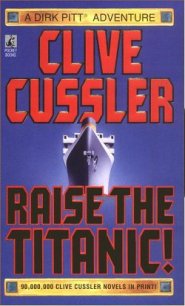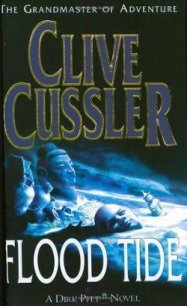Dragon - Cussler Clive (книги хорошем качестве бесплатно без регистрации .TXT) 📗
“I won’t fail your trust.”
Tsuboi set down the receiver and gazed out the observation window. A silence came over the control room as everyone waited on his word. There had to be another solution for delaying any retribution by the United States and other Western nations. Tsuboi was a smart man, and it only took him a few seconds to come up with alternate plans.
“How complicated is it to set off one of the bombs manually?” he asked the assembled engineers and scientists in the control room.
Kurojima’s eyebrows raised up questioningly. “To detonate without a coded signal?”
“Yes, yes.”
The technical brain who headed the Kaiten Project from start to finish bowed his head and answered. “There are two methods by which a mass of fissionable material can be made subcritical and forced to explode. One is to surround the mass by a ring of high explosives whose detonation will in turn set off the fissionable material. The other is to shoot together two masses by a cannon-type device.”
“How do we explode a bomb car?” Tsuboi demanded impatiently.
“Velocity,” Kurojima answered briefly. “The impact from a high-velocity bullet through the compressor shell and into the mass should do it.”
Tsuboi glared inquiringly. “Are you saying the bombs can be set off by nothing more than a shot from a rifle?”
Kurojima bowed his head. “At close range, yes.”
The effect on Tsuboi was just within the limits of credibility. “Then why don’t you simply program a robot to fire a high powered rifle into the air-conditioner shell?”
“There is the problem of time again.” replied Kurojima. “The robots that are programmed to drive the cars to their detonation sites are not constructed or programmed for anything else.”
“One of the roboguards, could it be modified?”
“The reverse. Security robots are designed for mobility and weapons fire. They are not designed to drive a car.”
“How long to make one that can do the job?”
“Weeks, no less than a month. You must realize we have to create a very complicated piece of machinery. We do not have one in production that can drive a car, climb out on articulated legs, open a hood, and shoot a gun. A robot with these built-in movements would have to be built from the ground up, and that takes time.”
Tsuboi stared at him. “We must detonate one within the next five hours to make the Americans think the system is operational.”
Kurojima’s confidence had returned. He was in control and his fear of Tsuboi had faded. He gave the financier a long steady look. “Well then, you’ll just have to find a human to do the job.”
It was about five in the evening, and the sky to the east was turning dark blue as the C-20 winged over the Pacific toward California. They were only two hours out of a refueling stop at Hickam Field in Hawaii. Loren looked down, straining her eyes to pick out the tiny shape and white wake of a ship, but she could see only the flat expanse of the sea and a few whitecaps.
She swiveled the executive chair she was sitting in and faced Suma. He sat arrogantly composed, sipping a glass of soda water. The shock of the hijacking and the distress at knowing Yoshishu had ordered his death had long since melted and he was now relaxed, supremely confident that he would regain the upper hand once he reached Washington.
He stared at her and smiled thinly. “So you intend to promote legislation to close all your markets to Japanese goods.”
“In light of what I’ve seen and experienced in the past few days,” said Loren, “do you blame me?”
“We Japanese have planned far into the future for just such a possibility. Our economy will survive because we have already invested heavily in the European and Asian markets. Soon we will no longer need the United States consumer. The closing of your market is merely another unfair tactic of you Americans.”
Loren laughed. “What do you know about fair trade practices?” Then she got down to serious business. “No foreigners can come into Japan to sell their products without being hassled to death by your trade barriers, stonewalled by your graft-ridden distribution system, and undermined by your home competition. All the while insisting that no outsider understands your culture.”
“Your behavior, Congresswoman Smith, is obviously motivated by racist anti-Japanese sentiments. We feel no guilt over expanding our international market shares. We started with nothing after the war. And what we have built, you want to take away.”
“Take what away? Your self-proclaimed right to rule the economic world?” Loren could just detect a hint of growing frustration in Suma’s eyes. “Instead of picking you up from the ashes and helping you build an enormously successful economy, perhaps we should have treated you the way you treated Manchuria, Korea, and China during your years of occupation.”
“Many of the postwar economic successes of those countries were due to Japanese guidance.”
Loren shook her head in wonderment at his refusal to acknowledge historical facts. “At least the Germans have demonstrated regret for the atrocities of the Nazis, but you people act as though your butchery of millions of people throughout Asia and the Pacific never happened.”
“We have freed our minds of those years,” said Suma. “The negative events were unfortunate, but we were at war.”
“Yes, but you made the war. No one attacked Japan.”
“It lies in the past. We think only of the future. Time will prove who has the superior culture,” he said with contempt. “Like all the other Western nations since ancient Greece, you will fall by decay from within.”
“Perhaps,” said Loren with a soft smile, “but then eventually, so will you.”
62
PENNER ROSE FROM a chair, turned, and faced the surviving members of the MAIT team who were seated in an office inside one of the commercial aircraft hangars. He tapped ashes from his pipe in a bucket of sand beside a desk and nodded at two men, one sitting, the other standing along the rear wall.
“I’m going to turn the briefing over to Clyde Ingram, the gentleman in the loud Hawaiian shirt. Clyde is blessed with the fancy title of Director of Science and Technical Data Interpretation. He’ll explain his discovery. Then Curtis Meeker, an old friend from my Secret Service days and Deputy Director of Advanced Technical Operations, will explain what’s circulating in his warped mind.”
Ingram walked over to an easel with a blanket thrown over it. He stared from blue eyes through expensive designer glasses attached to cord that dangled around the nape of his neck. His hair was a neatly combed brown, and he lived inside a medium-sized body whose upper works was covered by a black aloha shirt that looked as if it had been worn in a Ferrari driven around Honolulu by Tom Selleck as Thomas Magnum.
He threw the blanket off the easel and gestured a casual thumb toward a large photograph of what appeared to be an old aircraft. “What you see here is a World War Two B-Twenty-nine Superfortress resting thirty-six miles from Soseki Island on the seabed, three hundred and twenty meters, or for those of you who have trouble converting to metrics, a little over a thousand feet below the surface.”
“The picture is so clear,” said Stacy. “Was it taken from a submersible?”
“The aircraft was originally picked up by our Pyramider Eleven reconnaissance satellite during an orbit over Soseki Island.”
“You can get a picture that sharp on the bottom of the sea from an orbiting satellite?” she asked in disbelief.
“We can.”
Giordino was sitting in the rear of the room, his feet propped on the chair in front of him. “How does the thing work?”
“I won’t offer you an in-depth description, because it would take hours, but let’s just say it works by using pulsating sound waves that interact with very low frequency radar to create a geophysical image of underwater objects and landscapes.”




